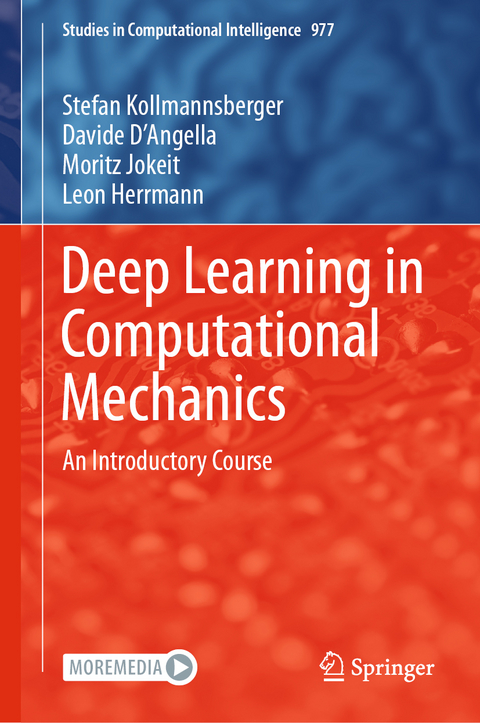
Deep Learning in Computational Mechanics
Springer International Publishing (Verlag)
978-3-030-76586-6 (ISBN)
This book provides a first course on deep learning in computational mechanics. The book starts with a short introduction to machine learning's fundamental concepts before neural networks are explained thoroughly. It then provides an overview of current topics in physics and engineering, setting the stage for the book's main topics: physics-informed neural networks and the deep energy method.
The idea of the book is to provide the basic concepts in a mathematically sound manner and yet to stay as simple as possible. To achieve this goal, mostly one-dimensional examples are investigated, such as approximating functions by neural networks or the simulation of the temperature's evolution in a one-dimensional bar.
Each chapter contains examples and exercises which are either solved analytically or in PyTorch, an open-source machine learning framework for python.
lt;b>Stefan Kollmannsberger is an adjunct teaching professor at the Technical University of Munich (TUM) and leads the research group Simulation in Applied Mechanics at the Chair of Computational Modeling and Simulation at TUM. He graduated in Civil Engineering and spent some years as an engineer in the industry before devoting himself to Computational Mechanics in Munich. He is dedicated to teaching, science, and, of course, his family. Stefan loved to design this lecture book together with Moritz, Davide and Leon. He uses it as a basis for the introductory course in the field of Artificial Intelligence in Computational Mechanics which he teaches among other subjects at TUM.
Davide D'Angella grew up in a small Italian peninsula dividing the Venetian Lagoon from the Adriatic Sea. After his high-school graduation, being firmly convinced he did not want to study any longer, he worked a couple of years as a computer programmer. This experience made him eager to deepen his theoretical understanding of the subject, giving him the motivation to continue his studies. He headed to the University of Milan, where he obtained a bachelor's degree in computer science. After a short Au Pair experience in Germany, he moved to Munich, where he got his master's degree in Computational Science and Engineering at the Technical University of Munich. Davide is now a research associate and Ph.D. candidate at the same university in the research group Simulation in Applied Mechanics at the chair of Computational Modeling and Simulation.
As a product of the "Mauerfall", Moritz Jokeit grew up in the non-existing town of Bielefeld and the alpine foothills near Rosenheim. Following his bachelor's degree in Civil Engineering, he studied Computational Mechanics at the Technical University of Munich (TUM) and the Polytechnic University of Catalonia (UPC). His passion for deep learning and computational mechanics was transformed into a master thesis that laid the groundwork for this lecture book. After his graduation he continued his research at the Chair of Computational Modeling and Simulation. He is now a doctoral candidate at the Institute for Biomechanics at the ETH Zürich.
Leon Herrmann has a very diverse background, born in South Africa and growing up in seven different countries. He did his bachelor studies in Mechanical Engineering at the Technical University of Denmark (DTU) and then continued his studies in Computational Mechanics at the Technical University of Munich (TUM). His main study and research focus has been in finite element methods and the simulation of fracture in composite materials. He is now working in the field of artificial intelligence in computational mechanics.
Introduction.- Fundamental Concepts of Machine Learning.- Neural Networks.- Machine Learning in Physics and Engineering.- Physics-informed Neural Networks.- Deep Energy Method
| Erscheinungsdatum | 08.08.2021 |
|---|---|
| Reihe/Serie | Studies in Computational Intelligence |
| Zusatzinfo | VI, 104 p. 41 illus., 22 illus. in color. With online files/update. |
| Verlagsort | Cham |
| Sprache | englisch |
| Maße | 155 x 235 mm |
| Gewicht | 299 g |
| Themenwelt | Informatik ► Theorie / Studium ► Künstliche Intelligenz / Robotik |
| Technik ► Maschinenbau | |
| Schlagworte | Artificial Intelligence • Computational Intelligence • Computational Mechanics • machine learning • Neural networks |
| ISBN-10 | 3-030-76586-5 / 3030765865 |
| ISBN-13 | 978-3-030-76586-6 / 9783030765866 |
| Zustand | Neuware |
| Haben Sie eine Frage zum Produkt? |
aus dem Bereich


